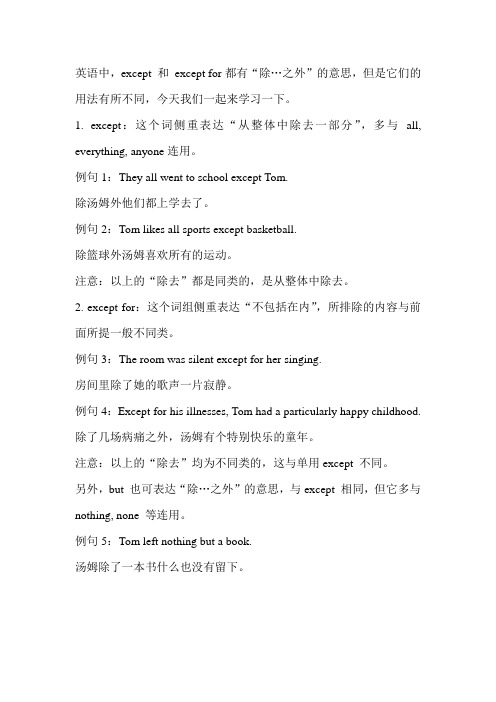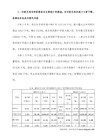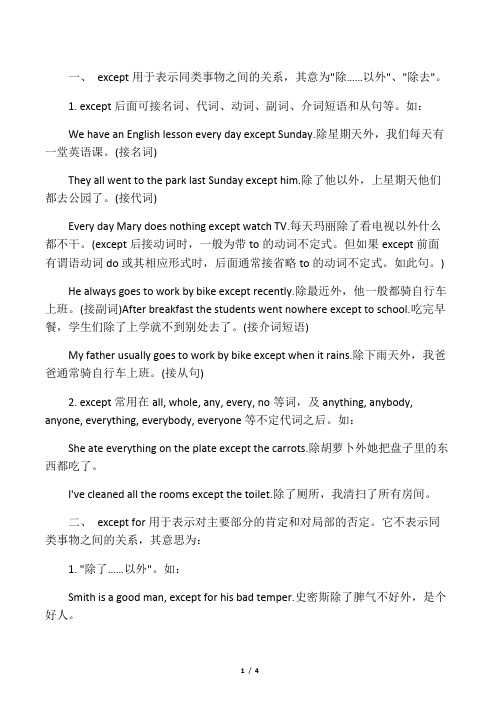except和except for的区别
- 格式:doc
- 大小:23.00 KB
- 文档页数:2

except和exceptfor的区别except和except for的区别一、引言在英语中,except和except for是两个常用的介词短语,它们都表示“除了之外”。
虽然它们的意思相似,但在用法和语境上存在着明显的区别。
本文将从多个角度探讨except和except for的不同之处。
二、含义和用法1.except的含义和用法except意为“除了之外”,表示在某个整体或集合中,除了某个或某些特定的部分或元素之外,其余的部分或元素都具有某种特性或符合某种条件。
它后面通常接名词、代词、动词-ing形式或从句。
例如:Everyone except Tom went to the park yesterday. 昨天除了汤姆,大家都去了公园。
I like all sports except swimming. 除了游泳,我喜欢所有的运动。
2.except for的含义和用法except for意为“除了之外”,表示在某个整体或集合中,除了某个或某些特定的部分或元素之外,其余的部分或元素都不具有某种特性或不符合某种条件。
它后面通常接名词、代词或动词-ing形式。
例如:The room is empty except for a few chairs. 除了几把椅子,房间是空的。
Your composition is good except for a few spelling mistakes. 除了几个拼写错误,你的作文写得很好。
三、区别和联系1.语境和用法的区别except通常用于在整体上排除某个或某些特定的部分或元素,强调剩余部分或元素的共性。
而except for则用于在整体上指出某个或某些特定的部分或元素的差异,强调剩余部分或元素的不共性。
因此,except for常常用来对某个整体或集合进行评价或判断,指出其中的不足之处。
例如:All the students except John passed the exam. 除了约翰,所有的学生都通过了考试。

except for用法exceptfor是一个介词,意思是“除了……之外”,表示在列举一系列事物时,除了某个特定的事物之外都是这样的情况。
它可以用于句子的开头、中间或结尾,通常与否定句一起使用。
例如:- 除了那个小偷,所有人都被释放了。
Except for the thief, everyone was released.- 我什么都不需要,除了你的爱。
I don't need anything except for your love.- 我很喜欢这本书,除了结尾有点令人失望。
I really like this book, except for the ending which was a bit disappointing.2. except for与except的区别except和except for虽然都表示“除了……之外”,但它们的用法是有区别的。
- except用于一个完整的句子中,表示“除了……以外,其他所有的都是这样的情况”,而不是特定的事物。
例如:Everyone except John liked the movie. 意思是“除了John之外,每个人都喜欢这部电影。
”- except for则强调特定的事物,相当于是“除了……这个特定的事物之外,其他都是这样的情况”。
例如:Everyone liked the movie except for John. 意思是“每个人都喜欢这部电影,除了John。
”3. except for的常见句型除了用于否定句的句型外,except for还有一些常见的用法: - except for + 名词例如:- 除了这个问题,这个项目很成功。
Except for this problem, the project was a success.- 我很喜欢这个餐厅,除了价格有点贵。
I really like this restaurant, except for the prices being a bit high.- except for + 动名词例如:- 我每天都锻炼身体,除了周末。

英语中,except 和except for都有“除…之外”的意思,但是它们的用法有所不同,今天我们一起来学习一下。
1. except:这个词侧重表达“从整体中除去一部分”,多与all, everything, anyone连用。
例句1:They all went to school except Tom.
除汤姆外他们都上学去了。
例句2:Tom likes all sports except basketball.
除篮球外汤姆喜欢所有的运动。
注意:以上的“除去”都是同类的,是从整体中除去。
2. except for:这个词组侧重表达“不包括在内”,所排除的内容与前面所提一般不同类。
例句3:The room was silent except for her singing.
房间里除了她的歌声一片寂静。
例句4:Except for his illnesses, Tom had a particularly happy childhood. 除了几场病痛之外,汤姆有个特别快乐的童年。
注意:以上的“除去”均为不同类的,这与单用except 不同。
另外,but 也可表达“除…之外”的意思,与except 相同,但它多与nothing, none 等连用。
例句5:Tom left nothing but a book.
汤姆除了一本书什么也没有留下。


一、except用于表示同类事物之间的关系,其意为"除……以外"、"除去"。
1. except后面可接名词、代词、动词、副词、介词短语和从句等。
如:We have an English lesson every day except Sunday.除星期天外,我们每天有一堂英语课。
(接名词)They all went to the park last Sunday except him.除了他以外,上星期天他们都去公园了。
(接代词)Every day Mary does nothing except watch TV.每天玛丽除了看电视以外什么都不干。
(except后接动词时,一般为带to的动词不定式。
但如果except前面有谓语动词do或其相应形式时,后面通常接省略to的动词不定式。
如此句。
)He always goes to work by bike except recently.除最近外,他一般都骑自行车上班。
(接副词)After breakfast the students went nowhere except to school.吃完早餐,学生们除了上学就不到别处去了。
(接介词短语)My father usually goes to work by bike except when it rains.除下雨天外,我爸爸通常骑自行车上班。
(接从句)2. except常用在all, whole, any, every, no等词,及anything, anybody, anyone, everything, everybody, everyone等不定代词之后。
如:She ate everything on the plate except the carrots.除胡萝卜外她把盘子里的东西都吃了。
I've cleaned all the rooms except the toilet.除了厕所,我清扫了所有房间。

except,besides,except for用法的关联和区别1.作介词用法时,这三个词都有"除…之外"的含义,但except常与do/does/did/have/has/hadnothing等词形成搭配用法,或者与全部肯定词all、everything、ev eryone等连用,或者与全部否定词nothing、nobody等连用,因此except加宾语作介词"除…之外"时常表示从整体中剔除一部分;而besides 作"除…之外"时则表示"另外附加"的含义,相当于"in addition to"。
试比较下列例句:1)He did not hing except watch TV yesterday.2)He said nothing except to smile just now.3)All the students took at rip except Tom yesterday.4)We need 3 more persons to finish the job besides/inaddition to us two.2.作介词用法时的except后可接多种情况的介词短语。
在这种情况下,except后的介词是不可省去的,except加介词的实际作用就相当于连词加相关的从句。
例如:1)The weather is fine today except in the northwest.此句相当于:The weather is fine today except that it is in the northwest.2)His mother never takes any exercise except on the dance floor.此句相当于:His mother never takes any exercise except that she has adance on the floor.需要强调的是except与except for的用法区别:1)Except后排除的内容与主语往往是同一类的,而exceptfor后所排除的内容与主语往往不是同一类的。
except / except for / apart from / aside from / besides / but的区别1.except VS except for虽然except和except for都表示“除去…之外”或“不包括”的意思,但并不能任意互换。
(1)except for的后面只能接名词和名词短语,而except的后面既可以接名词、名词短语,也可以接从句、代词、副词、介词短语甚至动词。
• You are allowed to smoke everywhere except in the lobby.(接介词)你可以在除大堂以外的任何地方抽烟。
• She looked everywhere except here.(接副词)除了这里,她哪都看了。
• She didn’t do anything except watch TV.(接动词)[见(4)]昨天下午,除了看电视她什么都没做。
• He usually goes to work by bicycle except when it rains. (接从句)除了下雨的时候,他通常骑自行车去上班。
• The dish you cooked was great except that it could use more salt.(接从句)你做的这道菜很好吃,就是味道可以稍微再咸一点。
在上面的例句中,我们不能用except for来替代except,这是因为只有在except后面才能接从句,而except for后不能接从句。
我们只能在except for后加名词或名词短语。
• My manager loves my report except for the few mistakes I made.除了几个错误以外,我的经理觉得我的这份报告很好。
• The parrot is totally green except for its yellow wings.这只鹦鹉除了翅膀是黄色的以外其它地方都是绿色的。
一、 except 用于表示同事物之的关系,其意"除⋯⋯以外 "、" 除掉 "。
1.except 后边可接名、代、、副、介短和从句等。
如:We have an English lesson every day except Sunday除.礼拜天外,我每日有一堂英。
(接名 )They all went to the park last Sunday except him除.了他以外,上礼拜天他都去公园了。
(接代 )Every day Mary does nothing except watch TV每.天除了看以外什么都不干。
(except 后接,一般 to 的不定式。
但假如 except 前面有 do 或其相形式,后边往常接省略 to 的不定式。
这样句。
)He always goes to work by bike except recently除.近来外,他一般都自行上班。
(接副 )After breakfast the students went nowhere except to school.吃完早饭,学生除了上学就不到去了。
(接介短 )My father usually goes to work by bike except when it rains.除下雨天外,我爸爸往常自行上班。
(接从句 )2.except 常用在 all, whole, any, every, no等,及 anything, anybody, anyone, everything, everybody, everyone等不定代以后。
如:She ate everything on the plate except the carrots.除胡卜外她把子里的西都吃了。
I've cleaned all the rooms except the toilet.除了所,我清了全部房。
except和except for
一、except和except for都表示“除了”。
在all,every no,everything,anybody,
nowhere这类词后面,两者都可用,后面跟名词或代词
(后面是代词时,必须是宾格):——考点
They all went to sleep except (for) Jim.除了吉姆他们都睡着了。
Everybody on me except (for) you.除了你谁都看不起我。
He ate the whole meal except(for)the beans.他把菜都吃了,除了豆子没吃。
We're all ready except (for) her).除了她我们都准备好了。
There's nobody I can trust except (for)him.除了他我谁都不信任。
(her——宾格,不能是主格she;只能用me,不能用I)——考点
二、在其他情况下,只能用except for(可译为“除了……外):
但用在all等词语前面时,只能用except for。
Except for John and Mary, nobody came.除了约翰和玛丽以外,谁也没有来。
三、except for一般用在名词短语前面。
l've cleaned the house except for the bathroom. 我已经把房子打扫了一遍.除了浴室以外。
The garden was empty except for one small bird. 花园里空荡荡的,只有一只小鸟。
四、介词和连词前面用except,不用except for.
It's the same everywhere except in Scotland. 哪里都是一个样,除了在苏格兰。
五、在动词do后面,只能用except do sth. except+动词:He does nothing except eat. do…except+不带to的动词不定式是一个常用的结构。
——考点
They did nothing except work.除了干活他们什么也不做。
He will do anything except cook.他什么都愿做,就是不愿做饭。
五、在其他情况下,通常必须用-ing形式。
She's not interested in anything except skiing. 除了滑雪外,她对什么都不感兴趣。
You needn't worry about anything except having a great time. 你什么也不用担心,只管玩得开心就行了
以下知识点作为了解:
1、except for有时还可表示“若不是……”:
Except for you,I should be dead by now.若不是有你,我现在都死了。
She would leave her husband except for the children.要不是为了孩子她就离开她丈夫。
2、从句:
This suit fits me well except that the trousers are too long.除了裤子太长,我穿这套很合适。
He has no special fault except he smokes too much.除了抽烟太多,他别无特别毛病。
He never came except when he was in trouble.除了遇到麻烦时他从不到这里来。
3、except 动词形式
①可用作动词,表示“把……除外”:
You will all be punished.I can except no one。
你们都要受到处罚,谁也不能除外。
The A students were excepted from taking the exam.得A的学生免于参加考试。
②常可用excepting引导短语,表示“除了”和“(不)例外”:
They were all saved excepting the captain.除了船长他们都获救了。
He answered all the questions excepting the last one.除了最后一道题,所有题目都答了。
All the boys were late,not excepting Jim.所有孩子都迟到了,吉姆也不例外。
4、有时也可在名(代)词后面用excepted,表示“除了”和“(不)例外”:
John excepted,everyone was tired.除了约翰大家都累了。
Everyone helped,John not excepted.大家都帮忙,约翰也不例外。
Everybody,myself excepted,said no.除了我大家都不同意。
5、名词形式为exception,表示“例外情况”:
There is an exception to every rule.每条规定都有例外情现。
Most children like sweets, but there are some exceptions.多数孩子都喜欢吃糖果,也有例外情况。
6、可用于with the exception of,表示“除了”:
I invited everybody with the exception of James.我邀请了所有的人,除了詹姆斯。
Everyone was tired with the exception of John.除了约翰大家都累了。
7、还可用于without exception,表示“毫无例外”:
You must answer all the questions without exception.你必须毫无例外回答所有问题。
All the vehicles are without exception old and rusty.所有车辆毫无例外都很旧,锈迹斑斑。
(10)8、也可用于be no exception,表示“也不例外”:
The law applies to all European countries; Britain is no exception.这条规律适用于所有欧洲国家,英国也不例外。
Marketing is applied to everything these days, and books are no exception.现今什么都要推销,书籍也不例外。